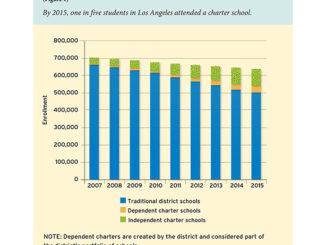
When a local advocacy group set out to see how closely teachers’ work was scrutinized in some of Los Angeles’ lowest-performing public schools, what they found alarmed them: Most of the teachers are not regularly evaluated and nearly all who are receive good ratings.
Parent Revolution’s analysis, based on public records, is ammunition for critics of the L.A. Unified School District.
It comes just days after a Rand Corp. study of an attempt to use teacher evaluations to boost student success. With “minor exceptions,” the study concluded, “access to effective teaching and dropout rates were not dramatically better” at schools that set up state-of-the-art evaluation systems.
Debate over why will probably go on for decades.
The Bill & Melinda Gates Foundation funded the massive effort Rand studied, using its influence and money to revamp teacher evaluations and push their importance for nearly a decade. L.A. Unified was one of many districts nationwide that changed practices as a result.
Parent Revolution’s look at 44 schools with low test scores adds another bit of data to the pile.
Last year, according to the nonprofit, more than two-thirds of teachers were not formally evaluated. Nearly all of those who were — 96% — were deemed to meet or exceed performance standards. This is at schools where, according to Parent Revolution, just 27% of students met or exceeded the state’s standards in English Language Arts and 20% in math.
The group said that of the 54% of teachers evaluated over a three-year period, as student test scores remained low, 97% received favorable ratings.
“You could argue that’s fine if the students are doing well,” said Seth Litt, Parent Revolution’s executive director. “But at least at the lowest-performing schools, I would want to look as closely as I can at all the inputs for student learning.”
Under a union agreement, L.A. Unified requires formal, documented annual evaluations for new teachers as well as for those with subpar previous ones. But principals can skip veteran teachers for up to five years.
A senior district official did not challenge the data in the analysis, but said that L.A. Unified has surpassed its current targets for annual evaluations. The district also intends to put more resources into the neediest schools, said Deputy Supt. Vivian Ekchian.
“We remain resolute,” Ekchian said. “As we better serve our students and families, we must provide more effective teacher training, mentoring and evaluation.”
The number of teachers rated as adequate or better is consistent across all schools, about 96.4%, she added. Many other districts also report high percentages.
“We do see this in other districts, where almost everyone has a satisfactory rating and it’s disconnected from student achievement,” Litt said. “It shouldn’t be disconnected.”
Parent Revolution works to build parent support for initiatives it favors. The group pushes for aggressive action to turn around low-performing schools and has worked to convert several to privately operated charter schools.
The analysis comes at a time when the district’s new senior leadership may be inclined to pay close attention. Supt. Austin Beutner has decried low achievement levels at many schools. The controlling majority on the Board of Education also has shifted. In 2017, board President Steve Zimmer lost his reelection bid to Nick Melvoin (the current board vice president). Zimmer had been a longtime teacher and distrusted evaluations based on standardized test scores. Melvoin taught briefly and later participated in an unsuccessful lawsuit to overturn teacher job protections as a way to purge bad teachers.
In L.A. Unified, a teacher’s evaluation is not supposed to be linked to test scores, although teachers are expected to use the data to inform their practice.
“Teachers know the importance of giving our students meaningful feedback on their work,” said Sarah Lillis, executive director of Teach Plus California, a nonprofit that runs teacher leadership programs. “We would hope that this same attitude of learning would be central to how we support and develop our teachers.”
The Parent Revolution data also could be used to highlight teacher turnover. Though the study didn’t focus on it, the data suggest that nearly one in three teachers left the 44 schools over the last two years the group analyzed. Maybe they were the low performers — or maybe not.
Many factors affect test scores — most prominently, student socioeconomic backgrounds, including whether their families are low-income or their parents have limited education. All the same, strong teaching obviously matters.
In an October speech to educators, Bill Gates suggested that teacher evaluations had their place but also their limits.
“We’ll no longer directly invest in teacher evaluation, but we’ll continue to gather data on the impact of these systems and encourage the use of all of those tools that help teachers improve their practice,” he said.



